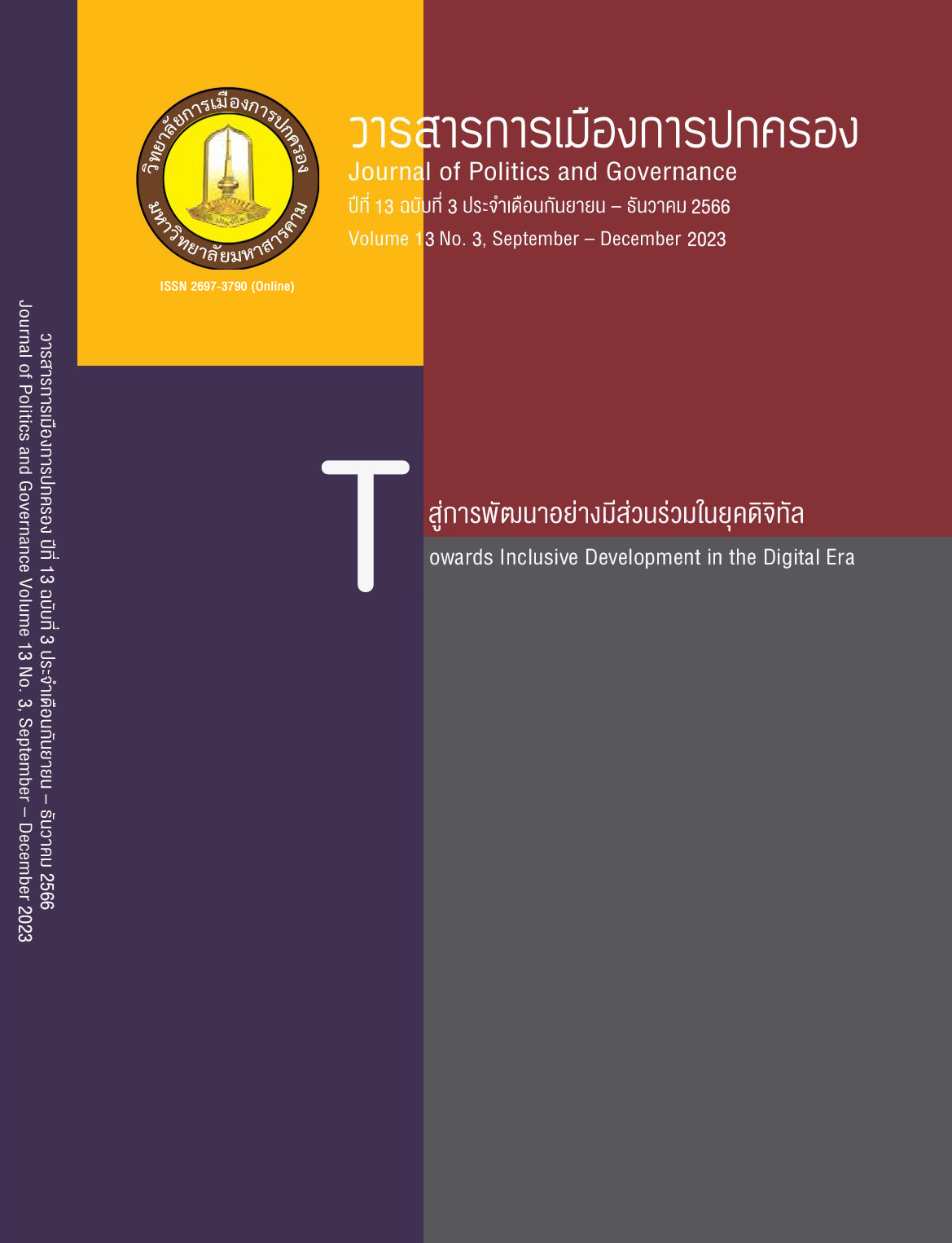The Justifications for The Right to Rebel against Tyranny in The Political Theory of Thomas Paine
Main Article Content
Abstract
This paper aims to provide an understanding of the justifications for the right to rebel against tyranny in the political theory of Thomas Paine. This research applied a political philosophy and theory method, namely, a textual analysis. The findings are that Paine’s tyranny is a situation in which the good people of the country are unfairly and grievously oppressed by an authoritarian or tyrant government as one of the evils in society. According to Paine, there are two types of tyranny: the tyranny of one person and the tyranny of a few persons. So, Paine argued that the justifications for the right to rebel against tyranny are: to protect liberty; to resist inequality; to change an unjust government; and to pursue the common good.
Article Details

This work is licensed under a Creative Commons Attribution-NonCommercial-NoDerivatives 4.0 International License.
References
พิศาล มุกดารัศมี. (2557). บนเส้นทางความคิดทางการเมืองจากคำพยากรณ์มหาวิหารเดลฟีถึงห้องรมแก๊สเอาชวิตซ์. โครงการส่งเสริมการแต่งตำรา มหาวิทยาลัยสุโขทัยธรรมาธิราช.
วิกิจ สุขสำราญ. (2565). ตัวบทกับการศึกษาปรัชญาการเมือง. เอกสารการสอนชุดวิชาปรัชญาการเมือง. สำนักพิมพ์ มหาวิทยาลัยสุโขทัยธรรมาธิราช.
วีระ สมบูรณ์. (2561). ทฤษฎีการเมืองกับความสัมพันธ์ระหว่างประเทศ. WAY of BOOK.
ศักดิ์สิทธิ์ ฆารเลิศ. (2564ก). ปรัชญาการเมืองเพื่อเสรีนิยมประชาธิปไตย: ว่าด้วย จอห์น สจ๊วต มิลล์ กับการต่อต้านทรราชเสียงข้างมาก. โรงพิมพ์มหาวิทยาลัยขอนแก่น.
ศักดิ์สิทธิ์ ฆารเลิศ. (2564ข). เสรีภาพเชิงลบคืออะไร?: บทวิเคราะห์อิสยาห์ เบอร์ลิน. วารสารการบริหารปกครอง มหาวิทยาลัยกาฬสินธุ์, 10(2), 112-133.
ศักดิ์สิทธิ์ ฆารเลิศ. (2565ก). แนวคิดว่าด้วยเสรีภาพเชิงบวกของอิสยาห์ เบอร์ลิน. วารสารมนุษยศาสตร์และสังคมศาสตร์ มหาวิทยาลัยพะเยา, 10(2), 237-254.
ศักดิ์สิทธิ์ ฆารเลิศ. (2565ข). ความคิดทางการเมืองของอิสยาห์ เบอร์ลิน: ว่าด้วยความแตกต่างระหว่างเสรีภาพเชิงลบกับเสรีภาพเชิงบาก. รายงานการประชุม การประชุมวิชาการระดับชาติเครือข่ายการศึกษาวิจัย และความสัมพันธ์ทางวิชาการด้านรัฐศาสตร์และรัฐประศาสนศาสตร์ ครั้งที่ 6. คณะรัฐศาสตร์และนิติศาสตร์ มหาวิทยาลัยบูรพา. 579-589.
สมบัติ จันทรวงศ์. (2565). แนวคิดทั่วไปเกี่ยวกับการศึกษาปรัชญาการเมือง. เอกสารการสอนชุดวิชาปรัชญาการเมือง. สำนักพิมพ์ มหาวิทยาลัยสุโขทัยธรรมาธิราช.
Beiner, R. (2014). Political Philosophy: What It Is and Why It Matters. Cambridge University Press.
Cogan, J. E. (2020). Chasing Utopia: The Evolution of Tyranny. (n.p.), 302 BOOKS.
Dipiero, J. (2017). The common law of rebellion. Georgetown Journal of International Law, 48(2), 605-633. https://link.gale.com/apps/doc/A5065 74675/GPS?u=threru&sid=bookmark-GPS&xid=b77f2bb7.
Kiger, P. J. (2023). How Thomas Paine’s ‘Common Sense’ Helped Inspire the American Revolution. https://www.history.com/news/thomas-paine-common-sense-revolution.
Leopold, D., & Stears, M. (eds.). (2008). Political theory: methods and approaches. Oxford University Press.
Nyirkos, T. (2018). The Tyranny of the Majority: History, Concepts, and Challenges. Routledge.
Moss, J., & Wilson, G. (1997). Common Sense. Literature and Its Times: Profiles of 300 Notable Literary Works and the Historical Events that Influenced Them (Vol. 1: Ancient Times to the American and French Revolutions (Prehistory-1790s). pp. 71-77. Retrieved from https://link.gale.com/apps/doc/CX2875100023/GPS?u= threru&sid=bookmark-GPS&xid=e6bf4ef8.
Paine, T. (1894a). The Magazine in America (1775). In Moncure Daniel Conway (ed.), The Writings of Thomas Paine, I (1774-1779). G. P. Putnam’s Sons.
Paine, T. (1894b). New Anecdotes of Alexander the Great (1775). In Moncure Daniel Conway (ed.), The Writings of Thomas Paine, I (1774-1779). G. P. Putnam’s Sons.
Paine, T. (1894c). An Occasional Letter on The Female Sex (1775). In Moncure Daniel Conway (ed.), The Writings of Thomas Paine, I (1774-1779). G. P. Putnam’s Sons.
Paine, T. (1894d). Common Sense (1776). In Moncure Daniel Conway (ed.), The Writings of Thomas Paine, I (1774-1779). G. P. Putnam’s Sons.
Paine, T. (1894e). The Forester's Letters (1776). In Moncure Daniel Conway (ed.), The Writings of Thomas Paine, I (1774-1779). G. P. Putnam’s Sons.
Paine, T. (1894f). The American Crisis (1776-1783). In Moncure Daniel Conway (ed.), The Writings of Thomas Paine, I (1774-1779). G. P. Putnam’s Sons.
Paine, T. (1894g). Emancipation of Slaves (1780). In Moncure Daniel Conway (ed.), The Writings of Thomas Paine, II (1774-1779). G. P. Putnam’s Sons.
Paine, T. (1894h). A Letter Addressed to the Abbe Raynal (1782). In Moncure Daniel Conway (ed.), The Writings of Thomas Paine, II (1774-1779). G. P. Putnam’s Sons.
Paine, T. (1894i). Dissertations on Government (1786). In Moncure Daniel Conway (ed.), The Writings of Thomas Paine, II (1774-1779). G. P. Putnam’s Sons.
Paine, T. (1894j). Answers to Four Questions on the Legislative and Executive Powers (1791). In Moncure Daniel Conway (ed.), The Writings of Thomas Paine, II (1774-1779). G. P. Putnam’s Sons.
Paine, T. (1895n). Letters to the Citizens of the United States (1802). The Writings of Thomas Paine, III (1791-1804). G. P. Putnam’s Sons.
Paine, T. (1894k). Address and Declaration (1791). In Moncure Daniel Conway (ed.), The Writings of Thomas Paine, II (1774-1779). G. P. Putnam’s Sons.
Paine, T. (1894l). The Rights of Man (1791-1792). In Moncure Daniel Conway (ed.), The Writings of Thomas Paine, II (1774-1779). G. P. Putnam’s Sons.
Paine, T. (1895a). the Republican Proclamation (1791). The Writings of Thomas Paine, III (1791-1804). G. P. Putnam’s Sons.
Paine, T. (1895b). To the authors of Le Républicain (1791). The Writings of Thomas Paine, Vol. III (1791-1804). G. P. Putnam’s Sons.
Paine, T. (1895c). To the Attorney General (1792). The Writings of Thomas Paine, III (1791-1804). G. P. Putnam’s Sons.
Paine, T. (1895d). Letter Addressed to the Addressers, on the Late Proclamation (1792). The Writings of Thomas Paine, III (1791-1804). G. P. Putnam’s Sons.
Paine, T. (1895e). Anti-Monarchy (1792). The Writings of Thomas Paine, III (1791-1804). G. P. Putnam’s Sons.
Paine, T. (1895f). Reasons for Preserving the Life of Louis Capet (1793). The Writings of Thomas Paine, III (1791-1804). G. P. Putnam’s Sons.
Paine, T. (1895g). Declaration of Rights (1793). The Writings of Thomas Paine, III (1791-1804). G. P. Putnam’s Sons.
Paine, T. (1895h). Appeal to the Convention (1794). The Writings of Thomas Paine, III (1791-1804). G. P. Putnam’s Sons.
Paine, T. (1895i). The Memorial to Monroe (1794). The Writings of Thomas Paine, III (1791-1804). G. P. Putnam’s Sons.
Paine, T. (1895j). Letter to George Washington (1796). The Writings of Thomas Paine, III (1791-1804). G. P. Putnam’s Sons.
Paine, T. (1895k). Dissertation on first principles of government (1795). The Writings of Thomas Paine, III (1791-1804). G. P. Putnam’s Sons.
Paine, T. (1895l). The Constitution Of 1795. Speech in The French National Convention. The Writings of Thomas Paine, III (1791-1804). G. P. Putnam’s Sons.
Paine, T. (1895m). From the Castle in the Air, to the Little Corner of the World (1797). The Writings of Thomas Paine, III (1791-1804). G. P. Putnam’s Sons.
Paine, T. (1896). the Age of Reason (1794). The Writings of Thomas Paine, IV(1791-1804). G. P. Putnam’s Sons.
Strauss, L. (1959). What is political philosophy and other studies. Greenwood Press.
Wilson, J. D., & Ricketson, W. F. (1989). Thomas Paine, Updated ed. Twayne's United States Authors Series 301. Twayne Publishers.


